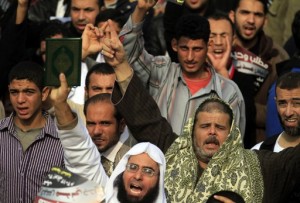UNITED NATIONS — After the heady and often dizzying political changes optimistically described as the Arab Spring, many of these same Middle Eastern states may be heading for what sadly looks like an Arab Winter. The seasonal political shift was predictable, but the end results remain in flux.
The three great Middle Eastern cities of learning and culture have been at various historical periods, Baghdad, Cairo, and Damascus. And once again the wheel of history returns to these places, where events are fast-unfolding in Iraq, and two Arab Spring states of Egypt and Syria.

After eight long years, American military forces are withdrawing from Iraq at year’s end. The Iraqi government and Washington failed to reach even a minimum agreement where a limited number of American troops could stay on in the country for training and security. So while the Obama Administration has fulfilled its promise to pull out of Iraq, it’s questionable whether the Baghdad’s fractious coalition government will be able to hold firm against domestic dissidents and or keep out of the regional orbit of Islamic Iran.
Even presuming that the Iraqi military is now ready for prime time security responsibilities, (notice I said presume) Baghdad’s squabbling sectarian politicians will soon find themselves bedeviled by domestic militias and shadowed by Islamic Iran. Mission Accomplished? We may not like the results.
A fundamental and wistful Western misperception has underscored much of the so-called Arab Spring process. While Egyptians rebelled against President Hosni Mubarak an entrenched autocrat, much of the failings of the old system dealt with corruption, social inequality and economic malaise. After the February revolution, Egypt was effectively governed by the military but the spirited political discourse was set by a spectrum of protesters who emerged from the crucible of Tahrir Square demonstrations. Indisputably, the Egyptian military, has played the role of kingmaker.
Now with national elections in the offing, a plethora of political parties ranging from the secular to the Muslim Brotherhood, are vying for power. The military with close ties and many shared interests with the United States, was jolted by President Barack Obama’s blunt warning to start a “full transition of power” to civilian rulers in a “just and inclusive manner.” Obama’s announcement also tried to bring leverage over a military force which receives $1.3 billion annually from the U.S. But the White House’s risky public diktat to Egypt’s generals may have crossed a political bridge of no return.
Recall the Egyptian military has supported a secular state and has backed the 1979 peace treaty with Israel, a keystone of Middle East stability. Critics fear that many Islamic factions who may win in the parliamentary elections do not share a commitment to secularism or the status quo with former rival Israel.
In Syria the pot has begun to boil. The Assad regime’s eight-month crackdown on dissent has killed over 3,500 civilians, according to the UN. Furthermore UN humanitarian agencies state that 3 million out of the country’s 22 million people have been affected as a result of civil unrest. Many have left their homes, been displaced, or become refugees.
And while the UN Security Council was unable to slap significant sanctions on Damascus due to Syria’s diplomatic support from Russia and China, now the unlikely censure comes from Arab League through a set of sanctions on a “brother Arab” state.
Significantly, Jordan’s respected King Abdullah clearly called on President Assad to “step down.” Once a Soviet client state, Syria today still maintains close political ties with Russia. Equally Syria has moved closer to China as a counter-weight to pressures from Europe. Perhaps most overlooked is Syria’ close alliance with the Islamic Republic of Iran, based in part on the Muslim Shiite minority faction holding power in Damascus.
France still holds some political sway over its former colony. Decisive Franco/American political cooperation pressured Syria to finally end its military occupation of Lebanon in 2005. Yet it remains highly unlikely that France will push for a military solution as it did in Libya. French Foreign Minister Alain Juppe warned that the Syrian government’s days are “numbered.” The European Union has imposed tough sanctions on Syrian oil imports.
Yet Egypt remains the key any way the geopolitical cards are shuffled. In Cairo, a political “Second Revolution” appears in the making. As with the fall of the Shah in 1979, and the descent of Iran into the Ayatollah’s apocalypse, Washington may come to rue the day that it misjudged the crisis in Egypt, and allowed a series of events to spiral out of control.
John J. Metzler is a U.N. correspondent covering diplomatic and defense issues. He writes weekly for WorldTribune.com.


You must be logged in to post a comment Login